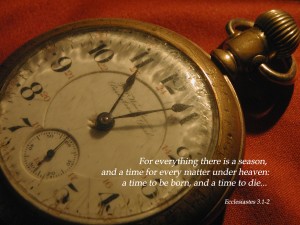Happy “Blankety-Blank” New Year
 I must confess that I have been disinclined to do any writing, preaching, worrying, considering, or resolving on the matter of the New Year. Perhaps you too, given the information overload with which we live these days, have reached a saturation point on the matter. ‘Everybody’ and her brother have expressed an opinion on how, when, what and whether one should make resolutions. I read lots of wise, wonderful and sound advise yet I was feeling as though if I saw one more obligatory Happy New Year post on facebook I was going to explode. One of my facebook friends, a wonderfully ironic, twenty-something-year-old-man posted in the wee hours of January 1, “This post has nothing to do with the year 2014,” and I laughed-out-loud and snidely replied from my saturated spirit, “A-freaking-men.”
I must confess that I have been disinclined to do any writing, preaching, worrying, considering, or resolving on the matter of the New Year. Perhaps you too, given the information overload with which we live these days, have reached a saturation point on the matter. ‘Everybody’ and her brother have expressed an opinion on how, when, what and whether one should make resolutions. I read lots of wise, wonderful and sound advise yet I was feeling as though if I saw one more obligatory Happy New Year post on facebook I was going to explode. One of my facebook friends, a wonderfully ironic, twenty-something-year-old-man posted in the wee hours of January 1, “This post has nothing to do with the year 2014,” and I laughed-out-loud and snidely replied from my saturated spirit, “A-freaking-men.”
Then, as I was resisting New Year’ images for worship (which is focused on Epiphany) and sitting down to write this Pastoral Reflection the Ecclesiastes 3 scripture lesson that is assigned for New Year’s Day came barreling into view and my spirit shifted. One reading of the text and I remembered the value of the spiritual practice inherent in celebrating New Year’s Eve—there is nothing quite like it—to stop and take notice of this moment in time by taking stock, letting go and welcoming the new! It is such a good practice that I am encouraging you to do so using the age-old wisdom of Ecclesiastes included here:
For everything there is a season, and a time for every matter under heaven: a time to be born, and a time to die; a time to plant, and a time to pluck up what is planted; a time to kill, and a time to heal; a time to break down, and a time to build up; a time to weep, and a time to laugh; a time to mourn, and a time to dance; a time to throw away stones, and a time to gather stones together; a time to embrace, and a time to refrain from embracing; a time to seek, and a time to lose; a time to keep, and a time to throw away; a time to tear, and a time to sew; a time to keep silence, and a time to speak; a time to love, and a time to hate; a time for war, and a time for peace. What gain have the workers from their toil? I have seen the business that God has given to everyone to be busy with. He has made everything suitable for its time; moreover he has put a sense of past and future into their minds, yet they cannot find out what God has done from the beginning to the end. I know that there is nothing better for them than to be happy and enjoy themselves as long as they live; moreover, it is God’s gift that all should eat and drink and take pleasure in all their toil.
Whether taking personal stock or taking stock of our faith community, we can use this text to measure all that has been and all that we hope to be. We can consider what needs to be ‘killed’ (eliminated) in ourselves and/or our community; and what or who or which relationships are in need of healing. We can measure our tears and the times we have laughed until we cried and find the blessings in both.
Using this text as a guide, we can ask questions like these: What does it mean to be born to new life or to “die” —with people in our lives or as a faith community? What might it mean to ‘plant or to harvest’ in the daily tasks to which we are called as individuals or as a community? How might we be more discerning about which is most appropriate? What does it mean in a time of mourning to remember that there will be dancing again? What about when I am laughing and others are grieving so much so they can’t seem to remember the sound of such joy anymore? How much would we benefit from remembering that there is, in fact, a time to simply keep silence and times when a voice of courage and hope is desperately needed? And what does it mean to us to remember that God holds it and all of us through it all, in all of our times?
What does it mean indeed, to remember that God holds it all and all of us through it all, in all of our times—even in our wisdom and joy-resistant, crabby, spiritually bankrupt times? Here is where my confession continues: I didn’t want to hear the Happy New Year’s wishes and the sweet, affirming goal setting stories because I was in a spiritual wilderness moment—and like most of us, I can enjoy the crabbiness of that place, for a little while. And I could probably get away with justifying my snarly, snarky spiritual condition, attributing it to the ongoing pain with which I am living from my broken arm or the stress of moving through the Advent/Christmas religious rush one-handed or any number of other reasons (a disappointing slight from a loved one, the resentments I have toward so-and-so, a broken newly manicured nail!?). But the truth is I was crabby because I was focused on myself and I forgot—and when I forget, I get afraid—and when I am afraid I go to that crabby, bankrupt place where everything seems annoying and stupid and I get even more afraid (it is a vicious cycle).
But of course that is why we have spiritual practices that encourage us to take stock and see our blessings; faith communities to remind us how much we are loved by God and each other; and spiritual guides to direct us to the texts, prayers and practices that keep us right sized and in right relationships! When we stay in the moment, when we remember that we can be certain of God’s unending love, when we ground ourselves in community we have the courage we need to faithfully explore and wonder about these important questions.
 Beloved, I pray that together we might remember that “For everything there is a season, and a time for every matter under heaven…” and that God holds it all and all of us through it all, in all of our times. Let’s be brave for 2014 and together we can always move from being focused on ourselves and being afraid to faithfully exploring and wondering about all that God has in store for us! Oh, and Happy beautiful, blessed, glorious, prosperous, joy-filled, courageous Happy New Year!
Beloved, I pray that together we might remember that “For everything there is a season, and a time for every matter under heaven…” and that God holds it all and all of us through it all, in all of our times. Let’s be brave for 2014 and together we can always move from being focused on ourselves and being afraid to faithfully exploring and wondering about all that God has in store for us! Oh, and Happy beautiful, blessed, glorious, prosperous, joy-filled, courageous Happy New Year!
With blessing and prayer, Rev. Wendy Miller Olapade/revwdmiller@comcast.net
